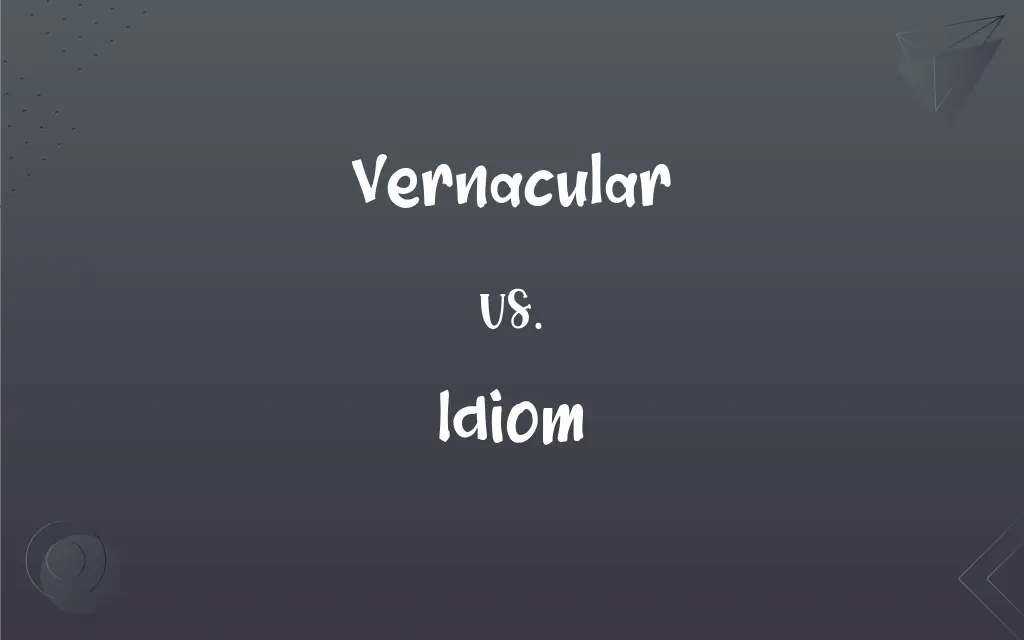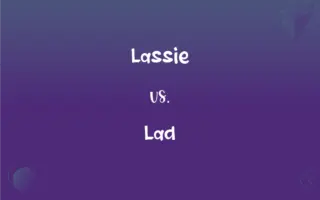Vernacular vs. Idiom: What's the Difference?
By Harlon Moss & Janet White || Updated on May 23, 2024
Vernacular refers to the everyday language spoken by ordinary people in a particular region, while idiom is a phrase or expression whose meaning isn't directly deducible from the individual words.

Key Differences
Vernacular is the common, everyday language spoken by people in a specific region or community. It includes the natural vocabulary, grammar, and expressions used in daily communication. Vernacular can differ significantly between regions, even within the same country, reflecting local culture and traditions. Idiom, on the other hand, is a specific type of expression within a language where the meaning is not literal but figurative. Idioms are often culturally specific and can be difficult for non-native speakers to understand because their meanings cannot be inferred from the individual words.
Vernacular language evolves over time, influenced by various social, economic, and cultural factors. It is a living language, constantly changing and adapting to new circumstances. Idioms also evolve but are more stable over time, often preserving historical or cultural references long after the original context has faded. While vernacular encompasses all aspects of a language used in daily life, idioms are specific phrases that often add color and expressiveness to the vernacular.
The use of vernacular is crucial in making communication accessible and relatable to local populations. It fosters a sense of identity and community among speakers. Idioms, however, add depth and nuance to language, often encapsulating complex ideas in a few words. They can be poetic, humorous, or profound, and their usage often signals a deep understanding of the language and culture.
Vernacular can vary widely between different regions, even within the same language. For example, American English and British English have distinct vernaculars. Idioms, while they may also vary, often have counterparts in other languages that convey similar figurative meanings, though the specific phrases may differ.
Vernacular is essential for effective communication within a community, reflecting the way people naturally speak. Idioms enrich the language, providing a way to express ideas creatively and memorably.
ADVERTISEMENT
Comparison Chart
Definition
Everyday language of a region
Expression with figurative meaning
Scope
Includes all natural language elements
Specific phrases within a language
Evolution
Constantly evolving
More stable over time
Cultural Significance
Reflects local culture and identity
Often preserves historical references
Usage
General daily communication
Adds depth and nuance to language
ADVERTISEMENT
Variability
Widely varies between regions
Varies but often has equivalents in other languages
Vernacular and Idiom Definitions
Vernacular
The natural vocabulary and grammar used daily.
She spoke in the vernacular, making her easily understood by locals.
Idiom
Expression whose meaning isn’t literal.
Break the ice is an idiom meaning to start a conversation.
Vernacular
Informal speech particular to a region.
His use of the local vernacular made the speech more relatable.
Idiom
Phrase with a figurative meaning.
Kick the bucket is an idiom meaning to die.
Vernacular
Language reflecting cultural and social norms.
The vernacular of teenagers often includes slang.
Idiom
Culturally specific phrase.
Bite the bullet is an idiom meaning to endure a painful situation.
Vernacular
The everyday language spoken by a people as distinguished from the literary language.
Idiom
Commonly used metaphorical expression.
Spill the beans means to reveal a secret.
Vernacular
A variety of such everyday language specific to a social group or region
The vernaculars of New York City.
Idiom
A speech form or an expression of a given language that is peculiar to itself grammatically or cannot be understood from the individual meanings of its elements, as in keep tabs on.
Vernacular
The specialized vocabulary of a particular trade, profession, or group
In the legal vernacular.
Idiom
The specific grammatical, syntactic, and structural character of a given language.
Vernacular
The common, nonscientific name of a plant or animal.
Idiom
Regional speech or dialect.
Vernacular
Native to or commonly spoken by the members of a particular country or region.
Idiom
A specialized vocabulary used by a group of people; jargon
Legal idiom.
Vernacular
Using the native language of a region, especially as distinct from the literary language
A vernacular poet.
Idiom
A style of artistic expression characteristic of a particular individual, school, period, or medium
The idiom of the French impressionists.
The punk rock idiom.
Vernacular
Relating to or expressed in the native language or dialect.
Idiom
A manner of speaking, a mode of expression peculiar to a language, language family, or group of people.
In English, idiom requires the indefinite article in a phrase such as "she's an engineer", whereas in Spanish, idiom forbids it.
Some of the usage prescriptions improved clarity and were kept; others that yielded discordant violations of idiom were eventually revised.
Vernacular
Of or being an indigenous building style using local materials and traditional methods of construction and ornament, especially as distinguished from academic or historical architectural styles.
Idiom
(programming) A programming construct or phraseology that is characteristic of the language.
Vernacular
Occurring or existing in a particular locality; endemic
A vernacular disease.
Idiom
A language or language variety; specifically, a restricted dialect used in a given historical period, context etc.
In the idiom of the day, they were sutlers, although today they'd probably be called vendors.
Vernacular
Relating to or designating the common, nonscientific name of a biological species.
Idiom
An established phrasal expression whose meaning may not be deducible from the literal meanings of its component words.
She often spoke in idioms, pining for salad days and complaining about pots calling the kettle black.
Vernacular
The language of a people or a national language.
A vernacular of the United States is English.
Idiom
An artistic style (for example, in art, architecture, or music); an instance of such a style.
The idiom of the expressionists
Vernacular
Everyday speech or dialect, including colloquialisms, as opposed to standard, literary, liturgical, or scientific idiom.
Street vernacular can be quite different from what is heard elsewhere.
Idiom
The syntactical or structural form peculiar to any language; the genius or cast of a language.
Idiom may be employed loosely and figuratively as a synonym of language or dialect, but in its proper sense it signifies the totality of the general rules of construction which characterize the syntax of a particular language and distinguish it from other tongues.
By idiom is meant the use of words which is peculiar to a particular language.
He followed their language [the Latin], but did not comply with the idiom of ours.
Vernacular
Language unique to a particular group of people.
For those of a certain age, hiphop vernacular might just as well be a foreign language.
Idiom
An expression conforming or appropriate to the peculiar structural form of a language.
Some that with care true eloquence shall teach,And to just idioms fix our doubtful speech.
Vernacular
A language lacking standardization or a written form.
Idiom
A combination of words having a meaning peculiar to itself and not predictable as a combination of the meanings of the individual words, but sanctioned by usage; as, an idiomatic expression; less commonly, a single word used in a peculiar sense.
It is not by means of rules that such idioms as the following are made current: "I can make nothing of it." "He treats his subject home." Dryden. "It is that within us that makes for righteousness." M. Arnold.
Sometimes we identify the words with the object - though by courtesy of idiom rather than in strict propriety of language.
Vernacular
Indigenous spoken language, as distinct from a literary or liturgical language such as Ecclesiastical Latin.
Vatican II allowed the celebration of the mass in the vernacular.
Idiom
The phrase forms peculiar to a particular author; as, written in his own idiom.
Every good writer has much idiom.
Vernacular
(architecture) A style of architecture involving local building materials and styles, not imported.
Idiom
Dialect; a variant form of a language.
Vernacular
Of or pertaining to everyday language, as opposed to standard, literary, liturgical, or scientific idiom.
Idiom
A manner of speaking that is natural to native speakers of a language
Vernacular
Belonging to the country of one's birth; one's own by birth or nature.
A vernacular disease
Idiom
The usage or vocabulary that is characteristic of a specific group of people;
The immigrants spoke an odd dialect of English
He has a strong German accent
Vernacular
(architecture) Of or related to local building materials and styles; not imported.
Idiom
The style of a particular artist or school or movement;
An imaginative orchestral idiom
Vernacular
(art) Connected to a collective memory; not imported.
Idiom
An expression whose meanings cannot be inferred from the meanings of the words that make it up
Vernacular
Belonging to the country of one's birth; one's own by birth or nature; native; indigenous; - now used chiefly of language; as, English is our vernacular language.
His skill in the vernacular dialect of the Celtic tongue.
Which in our vernacular idiom may be thus interpreted.
Idiom
Fixed phrase understood within a culture.
Let the cat out of the bag means to reveal a surprise.
Vernacular
The vernacular language; one's mother tongue; often, the common forms of expression in a particular locality, opposed to literary or learned forms.
Vernacular
A characteristic language of a particular group (as among thieves);
They don't speak our lingo
Vernacular
The everyday speech of the people (as distinguished from literary language)
Vernacular
Being or characteristic of or appropriate to everyday language;
Common parlance
A vernacular term
Vernacular speakers
The vulgar tongue of the masses
The technical and vulgar names for an animal species
Vernacular
Everyday language spoken by people in a region.
The novel is written in the vernacular of the American South.
Vernacular
Common language distinct from formal or literary language.
The poet chose the vernacular over formal diction.
FAQs
What is an idiom?
An idiom is a phrase or expression whose meaning isn't directly deducible from the individual words.
Is vernacular the same everywhere?
No, vernacular varies widely between different regions and communities.
How does vernacular differ from standard language?
Vernacular is informal and used in daily communication, while standard language is more formal and often used in official contexts.
Are idioms used universally?
Idioms are often culturally specific, though similar expressions may exist in different languages.
Why is vernacular important?
Vernacular is important for effective communication and cultural identity within a community.
Can idioms be part of the vernacular?
Yes, idioms can be part of the vernacular, adding color and expressiveness to everyday speech.
Do idioms translate well into other languages?
Idioms often do not translate directly due to their figurative meanings, but similar expressions may exist in other languages.
Can vernacular include slang?
Yes, vernacular often includes slang and other informal expressions.
What is vernacular?
Vernacular is the everyday language spoken by ordinary people in a particular region.
What makes idioms difficult to understand?
Idioms are difficult to understand because their meanings are not literal and require cultural context.
Is vernacular language considered proper?
Vernacular is considered proper within its cultural and regional context, though it may differ from formal standards.
Is vernacular used in literature?
Yes, vernacular is often used in literature to reflect authentic dialogue and cultural settings.
How does vernacular evolve?
Vernacular evolves through social, economic, and cultural influences over time.
Are idioms static or dynamic?
Idioms are generally more stable but can evolve or fall out of use over time.
Can someone learn vernacular language?
Yes, someone can learn vernacular language through immersion and interaction with native speakers.
Why are idioms important in language?
Idioms enrich the language, making it more expressive and colorful.
Can idioms be used in formal writing?
Idioms can be used in formal writing, but their appropriateness depends on the context and audience.
Can vernacular vary within the same country?
Yes, vernacular can vary significantly within different regions of the same country.
Are idioms easy for non-native speakers to learn?
Idioms can be challenging for non-native speakers due to their figurative meanings and cultural context.
Do idioms have literal meanings?
No, idioms have figurative meanings that differ from their literal words.
About Author
Written by
Harlon MossHarlon is a seasoned quality moderator and accomplished content writer for Difference Wiki. An alumnus of the prestigious University of California, he earned his degree in Computer Science. Leveraging his academic background, Harlon brings a meticulous and informed perspective to his work, ensuring content accuracy and excellence.
Co-written by
Janet WhiteJanet White has been an esteemed writer and blogger for Difference Wiki. Holding a Master's degree in Science and Medical Journalism from the prestigious Boston University, she has consistently demonstrated her expertise and passion for her field. When she's not immersed in her work, Janet relishes her time exercising, delving into a good book, and cherishing moments with friends and family.































































